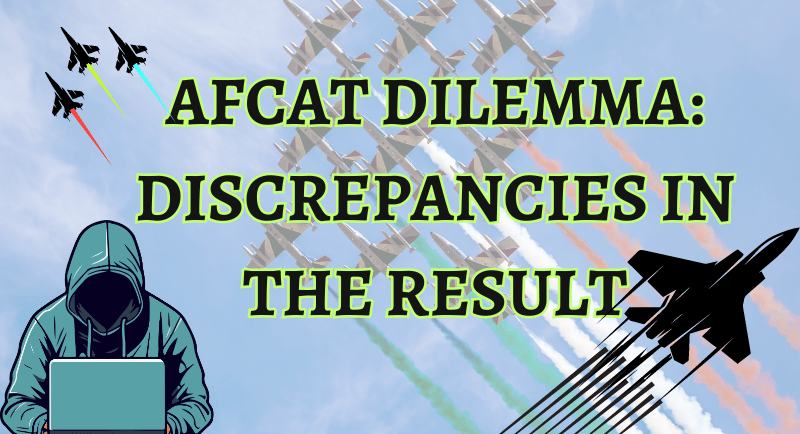AFCAT DILEMMA: DISCREPANCIES IN THE RESULT
"Expectation is the root of all heartache" - William Shakespeare


"Expectation is the root of all heartache"
- William Shakespeare
The above quote suggests that when we hold high expectations, particularly of others or situations, we set ourselves up for disappointment or emotional pain if those expectations are not met. On 30th September 2024, when the Indian Air Force (IAF) announced the result of the Air Force Common Admission Test (AFCAT) of 02/2024 some candidates were deeply shocked and felt heartache when their expectations failed to be met with the result. The examination was conducted from dated 9th August 2024 to 11th August 2024. The AFCAT result, 2024 created huge dissatisfaction among the candidates and caused an uproar in different parts of the country due to several issues concerning the scoring done by the AFCAT.
Candidates who have appeared for the examination have raised grievances before the concerned authority of the Air Force to disclose the answer key of the candidates who have appeared for the AFCAT examination in 2024. The result shocked the candidates because the score they obtained was beyond their expectations. AFCAT has vehemently and vigorously denied to disclose the answer key of all the candidates. It is shying away from accepting the fact that disclosure of the answer key of the aspirants/ candidates is the right of the candidates under the Right to Information Act. 2005 (RTI) which is a fundamental right guaranteed under Article 19(1)(a) of the Constitution of India, 1950.
Trail Of Disappointments And Frustrations Among The AFCAT Candidates
We should be conscious of the fact that indeed it is a common experience that whenever the results of any examination, be it of school, colleges, or any other bodies, especially the Public Service Commission (PSC) is declared, amidst the rejoicings of the successful candidates who have cleared the exam and secured the marks anticipated by them, it also inevitably brings with it a long trail of disappointments and frustrations as the direct outcome of the non-fructuation of hopes and expectations harboured in the minds of the examinees based on the candidates’ own assessment of their performance.
Labouring under a feeling that there has not been a proper evaluation of their performance in the examination, they would naturally like to have a revaluation of their answer sheets and even a personal inspection and verification of the answer sheets in order to assess or find out whether there has been a proper evaluation of the answers to all questions, whether there has been any tampering with the answer sheets, so on and so forth.
I am of the view that whether it is on the anvil of the legal holy trinity of justice, equity, and good conscience, or on the test of openness and transparency being inherent in human rights, or by the myriad tools of construction, or even by the Wednesbury Yardstick of reasonableness or for any other reasons which deemed fit to the AFCAT, the rejection to release/show answer key to the candidates would not sustain as it might peril the career of the candidates.
IAF Cannot Disclose The AFCAT Answer Sheets On The Ground Of Confidentiality?
In my opinion, the view of the IAF regarding the non-disclosure of the answer sheets of the candidates on the grounds of confidential information and shying away from their duty or responsibility to release answer sheets under the garb of the bar provided thereof under Section 08 of the RTI Act, 2005 or the stand that Section 4(1)(b) as well as sub-sections (2) (3), and (4) of the RTI Act does not include the answer sheets under the definition of “information” and answer sheets do not have the elements of ‘public domain’ or ‘public interest’ attached with it, the same should not be construed to be included within the purview of the RTI Act is nothing but a statement of red herring.
Disclosure Of The Answer Key Is A Right under the RTI Act, 2005
It cannot be denied that the Right to information was available much before the RTI Act came into force and it only provides machinery for making information available. It should be noted that disclosure of information related to every aspect of the examination is the rule, and secrecy is an exception. There has been a constant demand and openness and transparency in the IAF’s AFCAT examination and a positive participation of the Candidates and the body conducting the examination is necessary for a democratic state especially when candidates are appearing for an examination that will provide them an opportunity to serve the nation and keep the country always on the crest of the wave through their strenuous efforts made in the sky as an officer of the Air Force.
Disclosures serve an important aspect of public interest. The RTI Act is not to be read in a manner to curtail rights which the Constitution recognizes for the RTI Act does not say anything contrary to what the Constitution and rules related to the AFCAT says. Hon'ble Supreme Court in the case of State of U.P. v. Raj Narain [(1975) 4 SCC 428], very pertinently highlighted that the Right to Information is not only a constitutional right but it is also a fundamental right guaranteed under Article 19(1)(a) of the Constitution of India.
Moreover, the Apex Court in the case of Assn. for Democratic Reforms v. Union of India, [2024 SCC OnLine SC 150] also known as the “Electoral Bond Judgment” highlighted that the non-disclosure of information is violative of the right to information which is traceable to Article 19(1)(a) of the Constitution.
In the matter of Mradul Mishra v. Chairman, U.P. Public Service Commission, Civil Appeal No. 6723 of 2018 (Arising Out of SLP No. 33006 of 2017) dated 16.07.2018, the Hon'ble Supreme Court of India had while deciding the issue as to whether the Appellant is entitled to see the answer sheets of the examination in which he participated, held as under:
“14. In our opinion, permitting a candidate to inspect the answer sheet does not involve any public interest nor does it affect the efficient operation of the Government. There are issues of confidentiality and disclosure of sensitive information that may arise, but those have already been taken care of in the case of Aditya Bandopadhyay where it has categorically been held that the identity of the examiner cannot be disclosed for reasons of confidentiality.
15. That being the position, we have no doubt that the Appellant is entitled to inspect the answer sheets. Accordingly, we direct the Respondent - U.P. Public Service Commission to fix the date, time, and place where the Appellant can come and inspect the answer sheet within four weeks.
Therefore, the candidates who have spent a substantial amount of time, effort, and money in preparing for and appearing for the Test must be allowed to view their answer sheets within the stipulated time.
Way Forward
The candidates who are dissatisfied with the result of AFCAT 02/2024 may approach the Hon’ble Supreme Court by virtue of filing a writ petition under Article 32 of the Constitution of India and seeking relief as:
1. Allow the candidates to view their answer sheets;
2. Stay the AFCAT 02/2024 batch till the resolution of the issues or grievances
3. No adverse action should be taken against all the candidates who have appeared in the examination of AFCAT 02/2024 till the time matter is pending before the Hon’ble Court.
It is elementary that the candidates ought to know what the concerned authority is doing, and what is becoming a barrier in the release of answer sheets of the candidates. The openness or transparency in the examination and seeking information is the direct emanation from the right to know which seems to be implicit in the right of free speech and expression enshrined under Article 19 (1)(a) of the Constitution. Therefore, candidates are entitled to view their answer sheets. Since the RTI Act has been enacted to promote transparency and accountability in the working of every public authority like IAF/AFCAT, the authorities acting per contra to the rules and deny the request of the candidates to see their answer key on the grounds of secrecy and confidentiality. The same cannot be used as a shield to counter a request from a candidate to have access to his evaluated answer sheets and the RTI Act would obviously override such assurance.
It is the right earnest to mention here that “there are exams in life but not the life in exams” and therefore, every candidate should always aim for the betterment of the nation in whatever role or capacity he/she can irrespective of the result or the position he or she has acquired. Ultimately what matters is service to the nation by affirming the principle of “Service before self”.


About The Author
Amar Kumar Pandey
Amar is a 4th year law student at LLOYD LAW COLLEGE. He is working with the Law Chambers of Maj Kavish Aggarwala (Retd.) on a permanent basis.